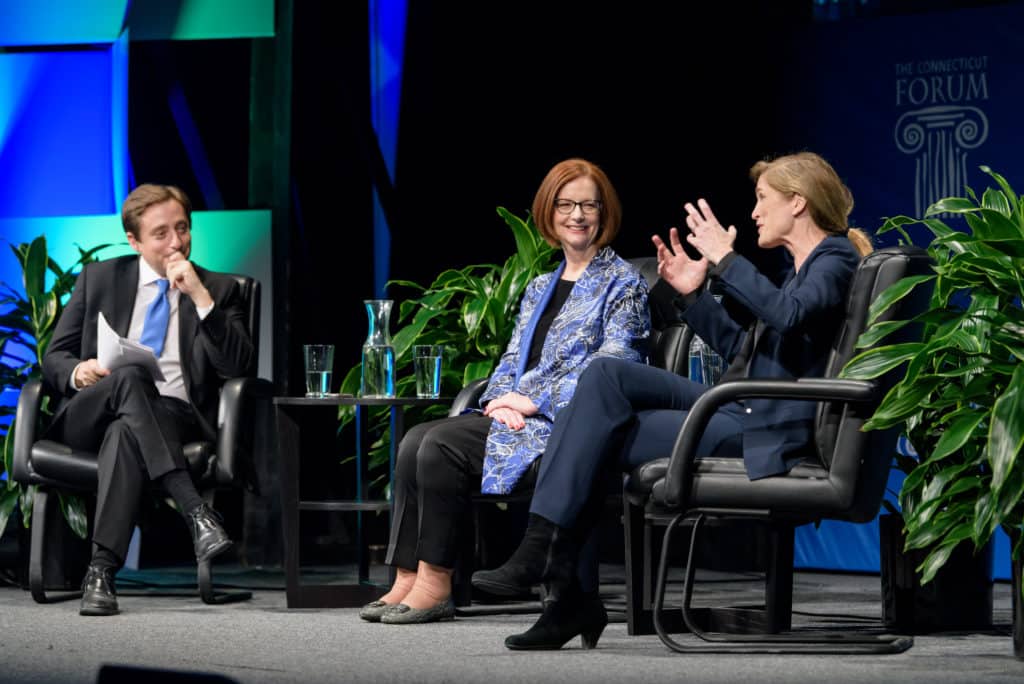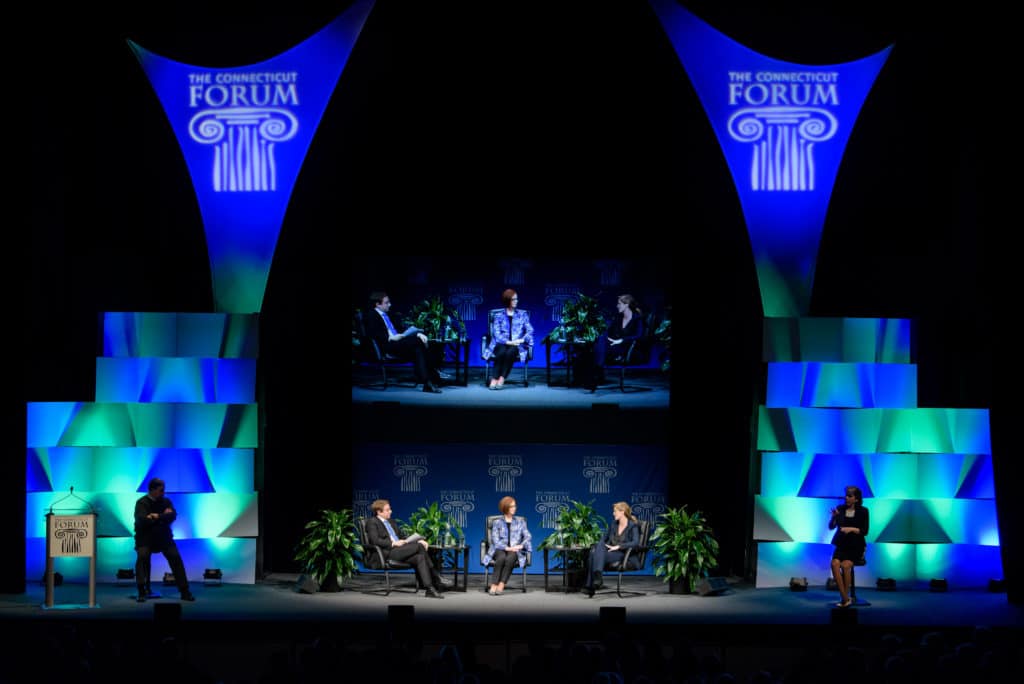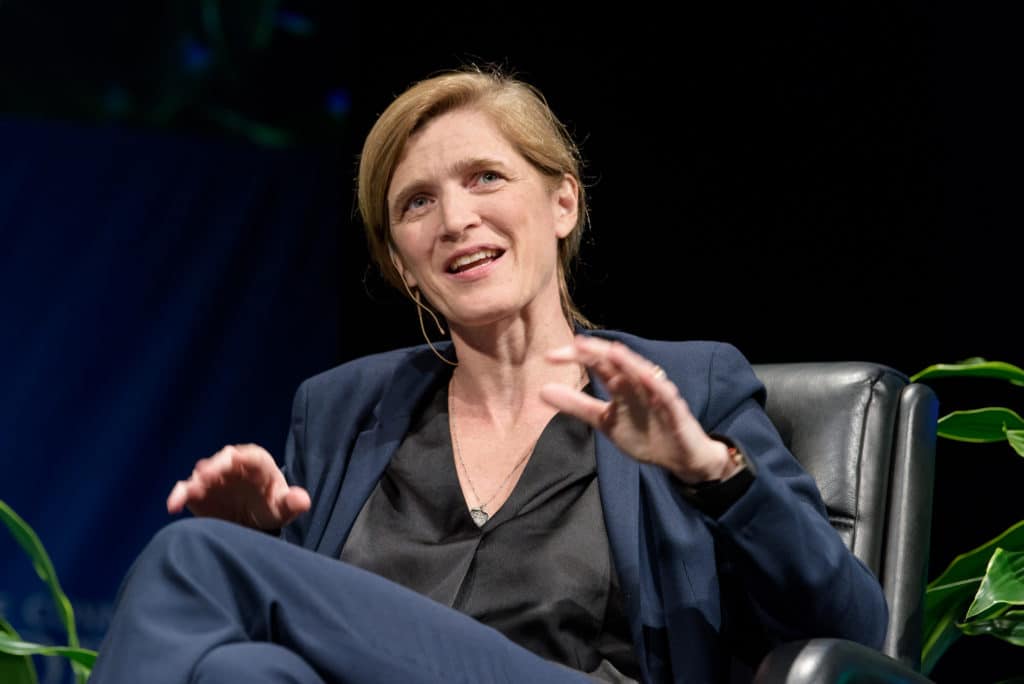Trinity Community Members Attend ‘America and the World’ CT Forum Featuring Global Policy Leaders
Trinity College students, faculty, and staff attended a recent Connecticut Forum event at the Bushnell Performing Arts Center featuring Samantha Power, former U.S. ambassador to the United Nations, and Julia Gillard, former prime minister of Australia. The two important policy leaders addressed the theme, “America and the World: Diplomacy and Leadership in the Age of Disruption.” Trinity is an education partner of the forum, which supports open dialogue, lifelong learning, and the free and active exchange of ideas.

Moderated by journalist Evan Osnos of The New Yorker, the conversation on March 9 tackled the array of challenges facing leaders in a rapidly changing world, such as national security, trade, the economy, the environment, human rights, and shifting global powers. Osnos began the conversation by introducing the two women as representing the “best of public service” and as principle players within high levels of government decision making. Power was named one of Time’s 100 most influential people and Gillard was the first woman to serve as Australia’s prime minister. Gillard noted that one of her most important roles in Australian domestic politics has been to reach out to people most at risk for being left behind. Power said that, similarly, during her time as an ambassador, her experience involved tackling issues of sexual violence.
Osnos asked Power what she believes to be the most important issue facing the world today that not enough people are talking about. Power suggested that climate change needs more attention and was excited about David Wallace-Wells’s book, The Uninhabitable Earth: Life After Warming. She noted that she hopes Wallace-Wells’s book will parallel Silent Spring, by Rachel Carson, which was about the harmful impact of pesticides. “Wells brings us to the brink of apocalyptic despair, and pulls us back, and says, ‘There is still time,’” she said. “This book brings it home to every corner of the world, and shows us the effects of climate change on all of society.”
Gillard agreed with Power, and also brought up the degree to which many people are unaware of the world around them. “We don’t often look up from our domestic politics to the whole world, and ask ourselves the big question about the post-World War Two global compact coming to an end. We must work out what will keep us together in the era beyond that compact. We’re talking about what we replace that compact with for the foreseeable future, in the next 50, or maybe, 100 years,” Gillard said.

Gun control was another important issue raised during the panel. In light of Australia having transformed gun control laws several years ago, Osnos asked Gillard to discuss Australia’s gun control reforms. Gillard explained the history of gun control laws, starting after Prime Minister Howard was elected in the 1990s. A horrific shooting occurred at a tourist facility in Tanzania, which motivated Howard’s decision making. “The nation reeled back in horror and wanted something done. Prime Minister Howard, in the aftermath, said he would bring gun laws to the parliament to tighten up ownership of guns. … The laws that were brought in made it so that you could only have a gun under extremely limited circumstances. The outcome of all of that is that we have not had a mass casualty shooting since,” she said.
Trinity students and other members of the campus community enjoyed the opportunity to hear from Power and Gillard. Thomas Peduto ’21 said that his biggest take-away was that collaboration is crucial for the present-day political climate. “The answers to the problems we face domestically and globally are not simple. Rather, they are incredibly complex and involve many variables. A bipartisan approach that promotes inclusion—all the while allowing for the fundamental values that the U.S. was based on—is the way forward,” he said.
After listening to the panelists, Theodore Wong ’22, said he had a greater appreciation of the importance of democratic values as a country and working together with other allies. “We as a nation have worked incredibly hard to climb to the top of the global food chain, and it is important to understand that isolating ourselves from the world and shunning longtime allies is not an effective foreign policy. It is imperative that the United States realign itself with our allies in the Pacific, EU, and NATO in order to counteract the increased influence of Russia and China,” Wong said.

The Connecticut Forum discussion strayed beyond these global topics, as well. Gillard and Power shared personal experiences, such as their funniest memories while being in the public eye. Power talked about her childhood, being raised by Irish parents in Dublin and then moving across the world to Pittsburgh. “Being thrust into a new situation—needing to learn the language and figure out what works—ended up being exactly what I had to do at the White House,” she said.
Trinity Assistant Professor of Political Science Isaac Kamola noted that the breaks from the more serious topics made it possible for audience members to get an idea of the inner life behind these political figures. “It was helpful to get a sense of the complex person behind the impossibly complex foreign policy decisions,” he said.
Wong also found it interesting to learn about the day-to-day lives of these influential figures. “Hearing their stories reminds us that although they are powerful people with incredible sway, they are still human. For example, Ambassador Power shared a story about how she was the lead singer in a band with other ambassadors at the United Nations, which was both fascinating and amusing,” he said.
The next Connecticut Forum event will be “Photo Wonders: The Life and Work of Extraordinary Photographers,” on Saturday, May 11. To learn more about the Connecticut Forum, click here.
